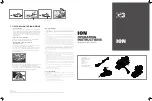
3
Dealer Pre-Delivery Instructions Grain Cart
WHEEL NUTS
Check ALL wheel nuts for correct torque setting. (3/4”-400 Ft-Lbs, 22mm-640 Ft-Lbs)
Tighten as needed. Re-Check wheel nut torque settings during initial break in period
(during 1st, 2nd, 3rd loads, etc.), then periodically afterwards (every 10 hours of use for
first 40 hours). Keep checking wheel nut settings until wheel nuts do not loosen. If wheel
nuts loosen and damage the surface of the wheel center, it will be impossible to keep
them tight. Failure to keep the wheel nuts tight could cause considerable damage to the
grain cart and surrounding. It is the Dealer’s responsibility to have wheel nuts torqued to
specification before delivery. Damage caused by failure to keep the wheel nuts tight is not
warrantable.
HITCH
Determine the hitch style of cart to be compatible with tractor. Tractor with hammer strap
(clevis type) should be used with grain carts equipped with a single prong (spade) hitch.
Tractors equipped with a single prong hitch (no hammer strap) should be used with grain
carts equipped with a double prong (clevis) hitch.
Be sure the tractor pin is at least 1/4” smaller in diameter than the pin hole in the grain cart
hitch to ensure enough free movement when traversing through uneven terrain.
POWER TAKE-OFF
Check for adequate clearance between telescoping PTO and tractor hitch. Suggested
clearance is 7 inches.
Check telescoping PTO for adequate extension. With the tractor hitched to the cart on flat
level ground, the PTO should have approximately 10 inches extended from the collapsed
(shortest) length.
UPPER AND LOWER AUGERS
Raise the auger to the unload position. Run the auger from the PTO or optional hydraulic
motor. If the top auger is misaligned with the bottom auger, you will hear a ‘bang’ as
the upper auger realigns itself with the lower auger. This is normal as the top auger has
dropped to engage the lower auger. Be sure that the top auger engages the lower auger.
Check bearing at top of auger. Be sure to have approximately 1/8” to 3/16” of an inch gap
under/between top auger bearing. Some models have bearings inside and some models
have bearings outside of upper auger housing. If there is no gap under the bearing, or the
gap is greater than 1/8” to 3/16”, the bearing needs adjusted.
HYDRAULIC CYLINDERS AND HOSES
Run all functions of the hydraulic cylinders and inspect fittings and seals for leakage. (use
cardboard or wood to check for hydraulic leaks)
(Continued on Next Page)




































